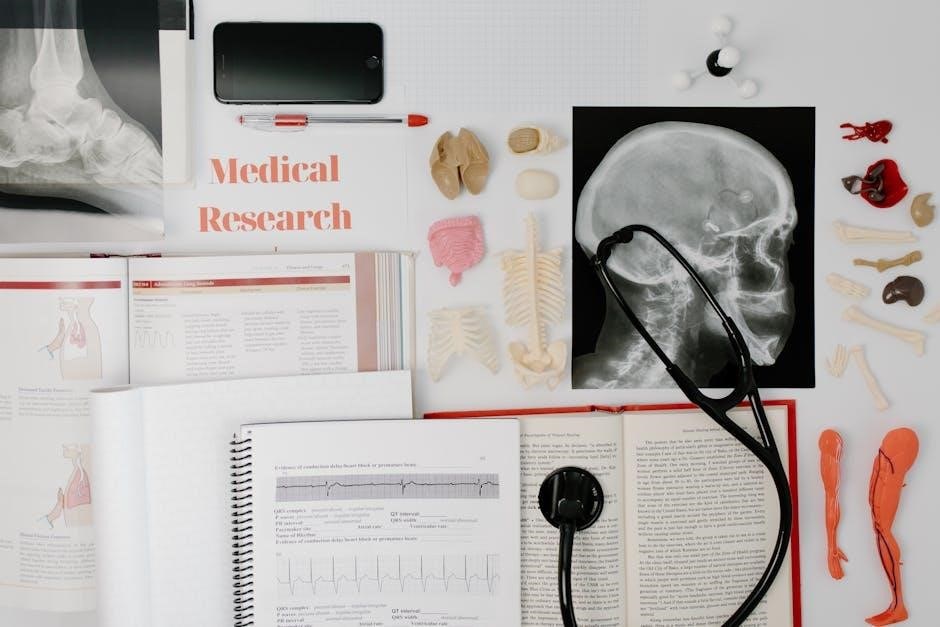AP Chemistry is an introductory college-level course designed to provide students with a deep understanding of chemistry principles and their applications․ It is a challenging program that prepares students for advanced studies in science, technology, engineering, and mathematics (STEM) fields․ The course emphasizes critical thinking, problem-solving, and laboratory investigations, aligning with the rigor of first-year college chemistry courses․
The curriculum is structured into nine units, covering topics such as atomic structure, chemical kinetics, thermodynamics, and chemical equilibrium․ These units build upon foundational concepts, allowing students to develop a comprehensive grasp of chemistry․ The course also includes hands-on lab work, which is essential for understanding experimental design and data analysis․

While textbooks are not strictly required, they serve as valuable resources for structured learning․ Popular choices include Zumdahl Chemistry (10th edition) and Tro’s Chemistry: A Molecular Approach (4th edition), which align well with the AP curriculum․ Additionally, online platforms like Khan Academy and YouTube channels such as Organic Chemistry Tutor offer supplementary materials for targeted study․

The AP Chemistry exam consists of two sections: a multiple-choice portion and free-response questions․ Students have 3 hours and 15 minutes to complete the exam, which assesses their mastery of both theoretical and practical knowledge․ Preparation requires a combination of textbook study, practice problems, and review of laboratory techniques․
By the end of the course, students are expected to demonstrate a sophisticated understanding of chemistry, enabling them to excel in future academic and professional pursuits․ The skills cultivated in AP Chemistry—such as analytical reasoning and scientific inquiry—are invaluable for success in STEM disciplines․

1․1 What is AP Chemistry?

AP Chemistry is an advanced high school course designed to provide students with a rigorous and comprehensive understanding of chemistry at the college level․ Offered as part of the College Board’s Advanced Placement (AP) program, this course is intended for students who demonstrate a strong foundation in science and mathematics and are eager to challenge themselves with material typically taught in a first-year college chemistry course․ AP Chemistry is structured to foster critical thinking, scientific inquiry, and problem-solving skills, preparing students for further studies in science, technology, engineering, and mathematics (STEM) fields․
The AP Chemistry curriculum is divided into nine units, each focusing on a specific area of chemistry․ These units include foundational topics such as atomic structure, chemical bonding, thermodynamics, and chemical equilibrium, as well as more advanced concepts like electrochemistry and nuclear chemistry․ The course emphasizes the development of scientific practices, such as experimental design, data analysis, and the interpretation of results․ Students are encouraged to think like scientists, exploring chemical phenomena through inquiry-based learning and laboratory investigations․
One of the key features of AP Chemistry is its alignment with college-level coursework․ The syllabus is designed to mirror the content and rigor of a first-year college chemistry course, ensuring that students who perform well on the AP exam are adequately prepared to earn college credit or advanced placement․ The course is particularly beneficial for students who plan to pursue degrees in chemistry, biology, physics, engineering, or related fields, as it provides them with a solid foundation in chemical principles and laboratory techniques․
The AP Chemistry exam, which students take at the end of the course, is a critical assessment of their knowledge and skills․ The exam is divided into two sections: a multiple-choice portion and a free-response section․ The multiple-choice questions test students’ understanding of chemical concepts, while the free-response questions require them to apply their knowledge to solve complex problems, analyze data, and explain chemical phenomena․ The exam is scored on a scale of 1 to 5, with scores of 3, 4, or 5 often qualifying students for college credit or advanced placement․
AP Chemistry is also notable for its emphasis on laboratory work․ Students engage in hands-on experiments and investigations that reinforce theoretical concepts and develop practical skills․ These labs cover a wide range of topics, from measuring molar masses and analyzing chemical reactions to exploring the behavior of gases and solutions․ The laboratory component of the course is essential for helping students understand the scientific method, collect and interpret data, and communicate their findings effectively․

In addition to the coursework and lab work, AP Chemistry places a strong emphasis on mathematical reasoning and problem-solving․ Students are expected to apply mathematical concepts, such as algebra and calculus, to solve chemical problems․ This integration of mathematics and science helps students develop a deeper understanding of chemical principles and prepares them for the analytical demands of college-level STEM courses․
For students who are considering taking AP Chemistry, it is important to note that the course requires a significant time commitment and dedication․ Students should have a strong background in algebra and a solid understanding of basic chemistry concepts before enrolling in the course․ Many schools recommend that students complete a rigorous high school chemistry course, such as honors or International Baccalaureate (IB) chemistry, before attempting AP Chemistry․
Despite the challenges, many students find AP Chemistry to be a rewarding and enriching experience․ The course not only provides students with a deep understanding of chemistry but also helps them develop essential skills in critical thinking, scientific inquiry, and problem-solving․ These skills are invaluable for success in college and beyond, regardless of the career path students choose to pursue․
1․2 Importance of Textbooks

In the context of AP Chemistry, textbooks play a pivotal role in providing students with a structured and comprehensive understanding of the subject․ While online resources and supplementary materials are increasingly popular, textbooks remain an indispensable tool for mastering the complex concepts and principles of chemistry․ A well-organized textbook offers a logical progression of topics, ensuring that students build a strong foundation in chemistry before moving on to more advanced ideas․ This structured approach is particularly important in a course like AP Chemistry, where each unit of study is designed to prepare students for the next․

One of the primary advantages of textbooks is their ability to provide in-depth explanations of chemical concepts․ Unlike online resources, which often focus on specific topics or practice problems, textbooks offer a holistic view of chemistry, connecting different ideas and illustrating how they fit into the broader framework of the subject․ For example, a textbook might explain the fundamental principles of atomic structure and then show how these principles relate to chemical bonding, thermodynamics, and reaction kinetics․ This integrated approach helps students develop a deeper understanding of chemistry and how its various components are interconnected․
Textbooks are also an excellent source of practice problems and exercises․ AP Chemistry requires students to apply their knowledge of chemical principles to solve complex problems, and textbooks provide a wealth of opportunities for practice․ Many textbooks include worked examples that demonstrate how to approach different types of problems, followed by exercises that allow students to test their understanding․ These practice problems are often aligned with the AP curriculum, ensuring that students are well-prepared for the types of questions they will encounter on the exam․ Additionally, textbooks frequently include review sections and chapter summaries, which are invaluable for reinforcing key concepts and identifying areas where further study is needed․
Another significant benefit of textbooks is their use of visual aids and illustrations․ Chemistry is a highly visual subject, and concepts such as molecular structures, chemical reactions, and laboratory equipment are often easier to understand when accompanied by diagrams, charts, and images․ Textbooks are rich in these types of visual aids, which help students to better grasp abstract ideas and make connections between theoretical concepts and real-world applications․ For example, a textbook might include detailed illustrations of laboratory apparatuses, allowing students to familiarize themselves with the equipment they will use in lab experiments․
Textbooks also serve as a valuable reference for students throughout the course․ Unlike online resources, which may require an internet connection and can be subject to changes or updates, textbooks provide a stable and reliable source of information that students can refer to again and again․ This is especially important in a course like AP Chemistry, where students are expected to retain and apply knowledge from earlier units as they progress through the curriculum․ With a textbook, students can easily review previous chapters or look up specific concepts whenever they need to clarify their understanding․
In addition to their academic benefits, textbooks can also help students develop good study habits and time management skills․ Many textbooks are designed with features such as chapter objectives, key terms, and review questions, which encourage students to engage actively with the material and take a systematic approach to their studies․ By working through a textbook in a structured and organized way, students can improve their ability to prioritize tasks, set goals, and manage their time effectively—skills that are essential for success in AP Chemistry and beyond․

While digital resources and online platforms have become increasingly popular in recent years, they cannot fully replace the value of a well-written textbook․ Textbooks offer a level of depth, organization, and coherence that is difficult to find in online materials, which are often fragmented or focused on specific topics․ Additionally, textbooks provide students with the opportunity to engage with the material in a more tactile and immersive way, which can enhance their learning experience and help them retain information more effectively․
For students who are preparing for the AP Chemistry exam, textbooks are an essential resource for review and practice․ Many textbooks include full-length practice exams, as well as strategies for approaching different types of questions and managing time during the test․ These resources are invaluable for helping students build confidence and develop the skills they need to perform at their best on exam day․ Furthermore, textbooks often provide detailed explanations of correct and incorrect answers, allowing students to learn from their mistakes and improve their understanding of the material․

